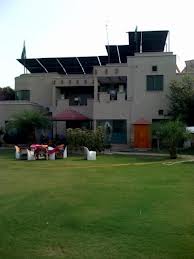
On an average summer’s day when the rest of Lahore sullenly waits in the heat for the electricity to return, Shahid Razzaq’s family lounges peacefully, their air conditioner running and all appliances working. While in other households the sudden and frequent power blackouts are greeted with groans and resigned sighs, the Razzaq family doesn’t even notice. And they certainly never have to switch on a generator.
That’s because they’re almost completely ‘off the grid’, having tired of the vagaries of Wapda some time back. Instead, they turn to what they consider to be a far more reliable source of power: the sun. And in a city that experienced up to 20 hours of loadshedding in a single day last summer, this is no small blessing.
Fed up of the never-ending power crisis, Razzaq took the plunge and installed solar cells on his roof. Of course he hasn’t yet fully cut the Wapda cord.
“We actually have a hybrid system running,” he says. “During the day when the sun is out, we use the solar cells. At night we shift to Wapda. Usually before we switch over, we know that we have about eight hours of backup electricity that has been generated during the day.” Razzaq appears to be content with this solution, as would anyone who isn’t sweating thanks to what is one of the most persistent problems in Pakistan.
Appliances that run on solar power in this house include two freezers, a television, computer, iron, microwave and, amazingly enough, two air conditioners.
“I can use anything and everything at home,” says his wife. “Never has life been so peaceful.”
Razzaq says that he has installed solar cells of six kilowatts. “But one can even get higher wattage and run only on solar power instead of using a hybrid line. In fact we have a surplus of electricity during the day time.”
Unfortunately, this surplus is more or less wasted here. In other countries surplus electricity is given back to the grid station and the same amount is returned to the consumer in the shape of free units through smart meters. But not in Pakistan.
“If only we could have this advantage, things would be so much easier and fair for the average citizen trying to actually conserve electricity,” he says.
His son-in-law, Moez Naseer, who is coincidently a software engineer in a solar power firm, explains that if the government shifts ever so slightly with regard to its policies and introduces one that allows citizens to generate their own electricity, everyone would be better off.
“Think of all the benefits of just one simple policy,” he says. “The government’s provision of electric power would meet the demand better, instead of being at a deficit all the time. For the consumer, it would be slightly expensive but at least he would get uninterrupted power, and it would be a relief to solve your power issues on your own.”
They both stress that if the government would take this into serious consideration, this would prove to be a landmark step towards the future of energy in Pakistan.
It is true that the initial investment cost was high for Razzaq. “For our six kilowatt solar panels, including the batteries, the invertors, installation, etc. it all came to about Rs900,000. But that is nothing compared to the running cost of fuel used in a generator, not to mention the fact that you’re using up fossil fuels, and causing both air and noise pollution. Our decision to install solar panels did not just revolve around the financial aspect, although of course that was a major part of it. Our decision was also based on the environmental aspect.”
Razzaq has installed 34 solar panels of 235 watts each, costing up to Rs80 per watt. Cleverly he has not been sucked into branding and has instead imported unbranded panels from China, and has had them installed separately. The batteries are of 200 Amp each and he must use eight batteries to provide him for four hours backup everyday.
“We use the ACs but if someone doesn’t want to consider putting up an AC in his house or office, then the cost can come down greatly,” he says, giving an estimated decrease of about Rs0.5 million at least for the initial installment. “There is really no maintenance cost, except taking care of the batteries and having them changed every seven years or so. But that is nothing compared to the maintenance cost of generators.”
With this investment, they find that the durability is a lot to boast about. The batteries can last up to seven or eight years (there are dry ones that he uses but wet batteries can also be used), while the solar cells can last up to 25 years. In winter or in an overcast day the yield will definitely be less, but then so is the overall pressure on the grid. But perhaps the greatest sign of the success of his approach is the amount of people who ask him how his system works.
Razzaq argues that the more people who opt to go solar, the lower the overall cost will become. Not only will there be greater competition in the market, but banks may also launch products that make it easier to finance solar-powed solutions. And there is certainly a great deal of interest in solar power, as evidenced by the interest people show in Razaaq’s solution.
“A lot of people have shown interest in this and have asked me to help them out,” he says. “The best part is that there is no harm being done to the environment in any way, and that there is just no ‘wastage’ of electricity: it’s clean energy, and Pakistan should seriously tap into this on a local and governmental level,” he says.
